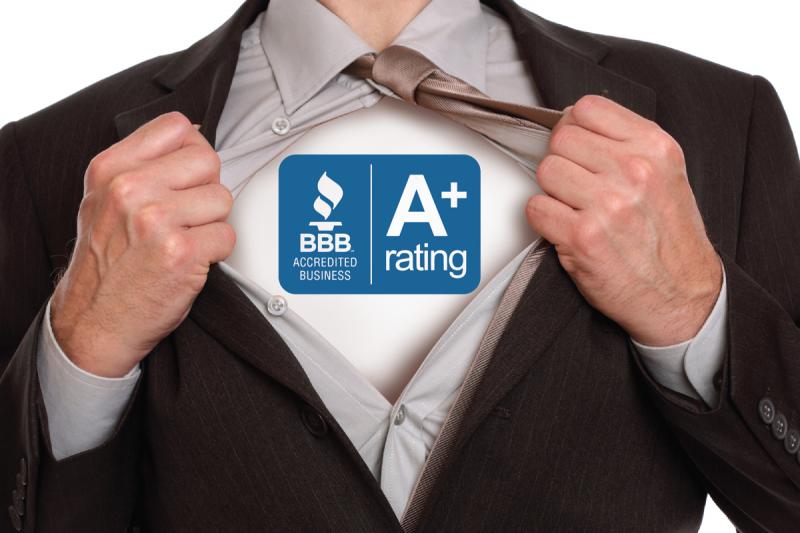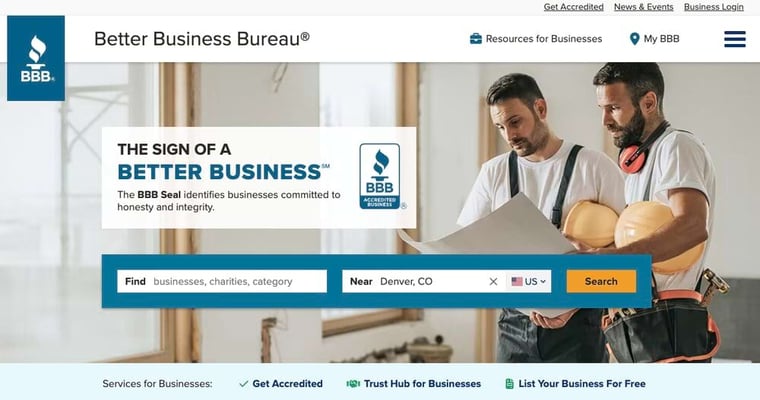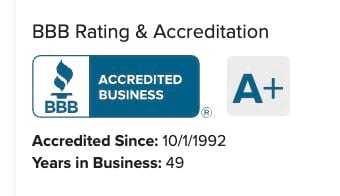BBB Accreditation: Is It Still Worth It?
Updated on February 16, 2023
For over 100 years, the Better Business Bureau (BBB) has been a resource for customers to determine the trustworthiness of a business.
The BBB stamp of approval means a business has met the organization’s high standards of business practices but doesn’t mean the BBB has tested products or services directly.
In an age where anyone can quickly search sites like Google and Yelp for real-time customer feedback, is applying for BBB accreditation even worth it?
The short answer is that it depends on your business. We know that seems like a non-answer, but the fact of the matter is that you need to evaluate the pros and cons of BBB accreditation and decide for yourself whether it’s worth it.
In this blog, we’ll outline what it means to be accredited with the BBB and how you can begin to determine if that is something you’ll want for your small business.
BBB Rating vs. accreditation
If you’ve spent some time on the Better Business Bureau’s website, you might have noticed that some businesses have a rating and are listed as accredited by the BBB while others are just rated.
The difference between having a BBB rating and being accredited is fairly simple:
- Rating: A business’s BBB rating is determined using information obtained directly from the business and public data sources. The BBB also takes customer complaints into account but does not use customer reviews to determine ratings. This is because a BBB rating is not designed to be a complete marker of a company’s overall quality.
Accreditation: To become accredited, businesses must adhere to the 8 standards outlined by the BBB. These are designed to ensure that only upstanding, reputable businesses are given accreditation and are representative of what the BBB considers to make a business trustworthy. 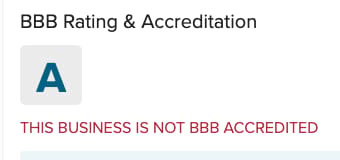
It’s important to remember that having your business rated by the BBB is free, whereas you must pay dues in order to be accredited by the organization.
On the flip side, a company’s rating is not going to paint a complete picture of how that company operates and whether it can be trusted, whereas accreditation is meant to ensure a company’s integrity.
If you’re looking for more detail on rating vs. accreditation or any other elements of the BBB, be sure to check out their FAQ page.
BBB Standards of Trust
In order to become accredited, businesses must adhere to the 8 standards of trust outlined by the BBB. Before we dive deeper into what exactly you need to do to become accredited, let’s discuss briefly what these standards are:
- Build Trust: Establish and maintain a positive track record in the marketplace.
- Advertise Honestly: Adhere to established standards of advertising and selling.
- Tell the Truth: Honestly represent products and services, including clear and adequate disclosures of all material terms.
- Be Transparent: Openly identify the nature, location, and ownership of the business, and clearly disclose all policies, guarantees, and procedures that bear on a customer’s decision to buy.
- Honor Promises: Abide by all written agreements and verbal representations.
- Be Responsive: Address marketplace disputes quickly, professionally, and in good faith.
- Safeguard Privacy: Protect any data collected against mishandling and fraud, collect personal information only as needed, and respect the preferences of customers regarding the use of their information.
- Embody Integrity: Approach all business dealings, marketplace transactions, and commitments with integrity.
These are the backbone of what the BBB stands for, and you must abide by them if you want to become accredited.
Qualifications
Because the BBB’s purpose is to create a network of trustworthy businesses, not every business can become BBB accredited. In addition to filing an official application, each potential business has to meet minimum qualifications to even be considered.
These are the accreditation standards outlined by the BBB:
-
Businesses must already have a “B” or better rating. If your business is not currently listed on the BBB, you should claim your free BBB profile.
-
Businesses must have been actively providing services or selling products for 6 months minimum.
-
Businesses must be able to provide trade references and pass a BBB evaluation.
-
Businesses must not have any outstanding BBB complaints.
-
Some businesses may have to undergo a meeting with a BBB representative.
-
Businesses must be willing and able to meet and uphold the 8 “Standards for Trust” of the BBB.
The Accreditation Process
Meeting the BBB’s standards is the main hurdle to accreditation. Once your business meets the qualifications, you’ll receive an invitation to apply from a BBB director.
After completing the application, the information provided is reviewed and verified, the business is researched, and additional information and proof of provided information may be requested.
Your best bet will be to provide as much information as you can upfront so that the process is not drawn out, but sometimes that can’t be helped. Don’t stress too much! Hiccups in the accreditation process happen but they don’t mean that you won’t be approved.
Once you’re approved, you’ll be asked to pay your first round of membership dues. Upon doing so, you’ll be officially accredited and will be permitted to display the BBB badge on your website!
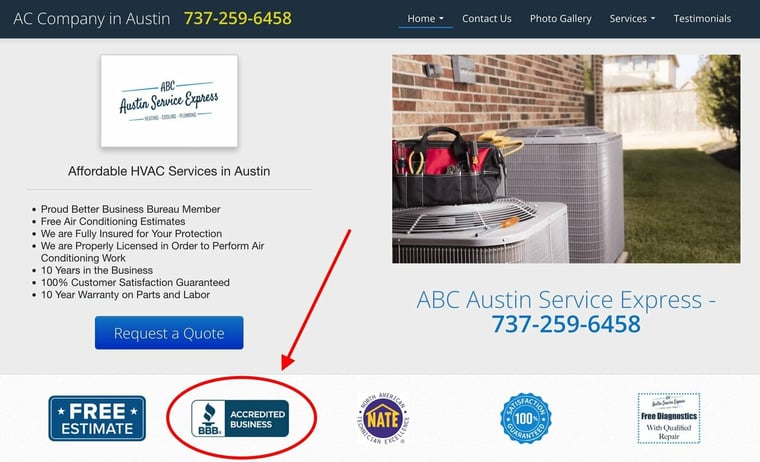
Membership Fees
Following accreditation, you’ll be expected to pay fees to remain listed as an accredited business. Fees range depending on the size of your business and could vary depending on your location as well.
In order to determine how much BBB accreditation would cost you every year you’ll need to reach out to your local chapter. Here’s an example of what you might be expected to pay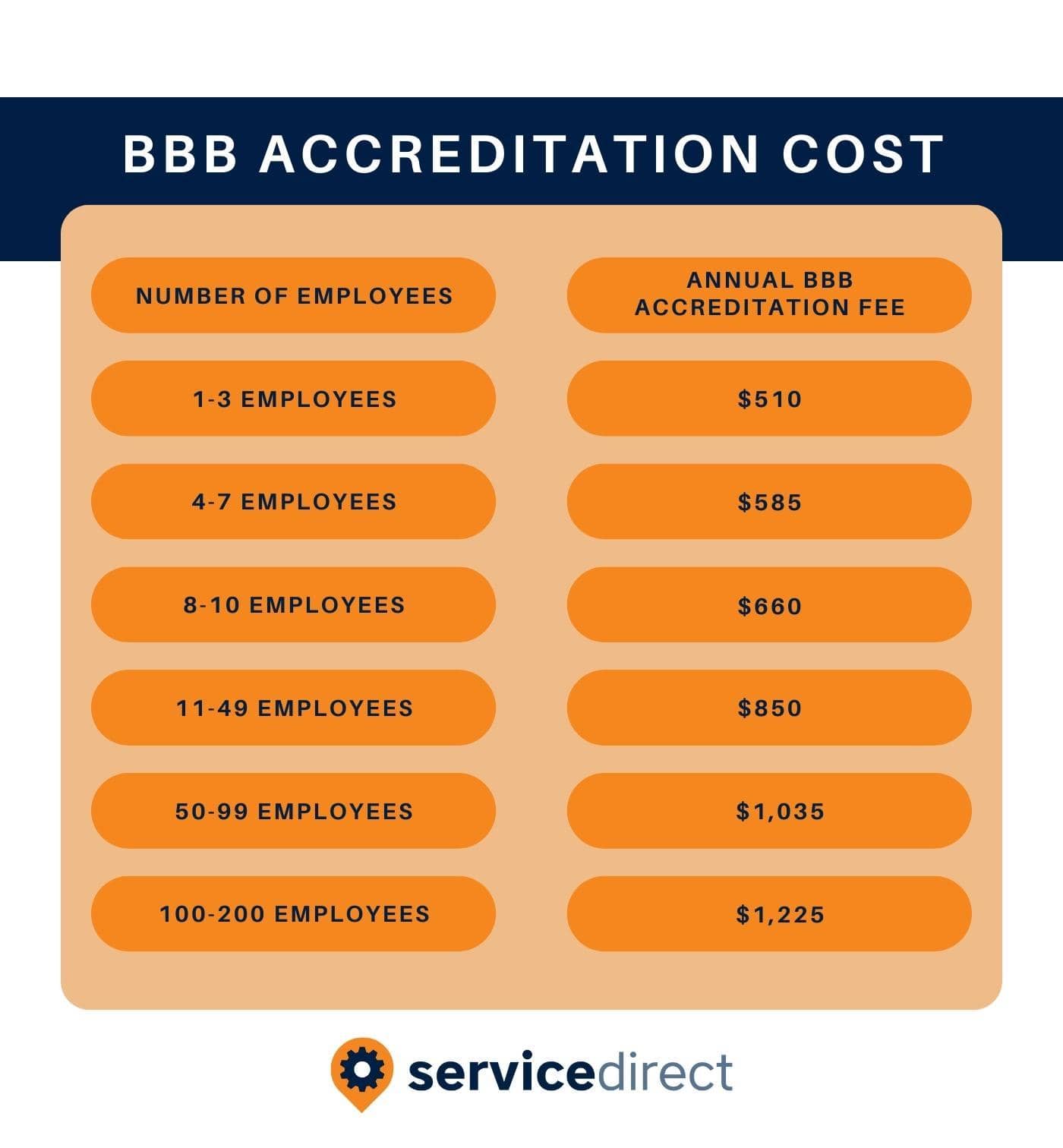
Once you stop paying, you lose accreditation; although it’s important to note that your business profile remains, as well as your BBB rating.
Pros and cons of bbb accreditation
As we’ve already mentioned, each business should evaluate for themselves whether or not BBB accreditation is worth it. Hopefully, these pros and cons will help make that decision a little clearer for your small business.
PRO: Local Orgs Like the BBB Matter to Consumers
BBB Accreditation lends a professional “stamp of approval” from a company that has stood for integrity and trust for over 100 years. When deciding what brand to choose when making a purchase, many consumers still search for that blue torch icon on the website of a business before making their choice.
In a survey we conducted of 614 US consumers, 69% of consumers said that it is important to them whether or not a small business is associated with a local, professional organization like the Better Business Bureau.
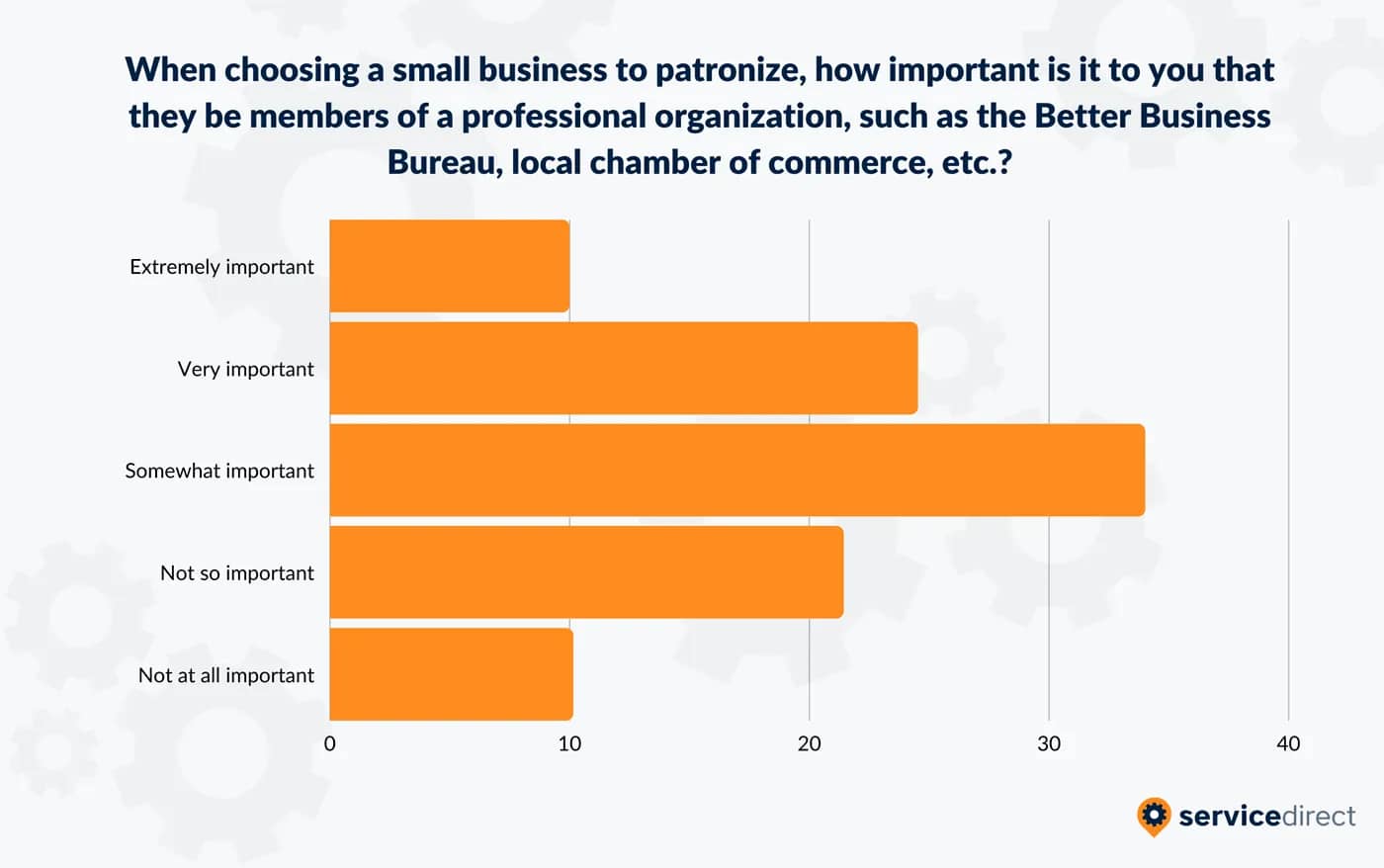
In other words, if you are accredited by the BBB and are able to use their badge on your website, you could already be on your way to positively connecting with over two-thirds of US consumers. Having a 3rd party like the BBB recommend your business for its honorability instantly boosts your brand’s credibility.
CON: Staying BBB Accredited Can Be Expensive
We’ve already touched on this, but as it is the largest reason many businesses might opt out of BBB accreditation, it deserves mentioning again.
The BBB prices their fees on a sliding scale depending on the size of your company in an attempt to make accreditation accessible for even the smallest of businesses.
In theory, this is great. But in practice, it means that for businesses in the middle of their pricing scale, BBB accreditation might be too draining on their budget.
PRO: BBB Resources Offer Valuable Insights
The BBB offers many programs, some of which are free to all businesses and others that are only available to accredited businesses. With over 100 years of working with businesses, the BBB is able to provide helpful tips, tools, and other resources to give small businesses opportunities to grow.
If you enjoy having a lot of information at your fingertips, this could be a reason to consider becoming BBB accredited. However, it’s important to remember that there are a number of other, free resources available for small businesses like newsletters and blogs.
CON: Your Customer Service Needs to Be Premier
As a small business, you already know how important a great customer experience is for your growth and success. You should always be working to improve the customer service skills at your company.
With the BBB, this is more important than ever. Being accredited looks good in the eyes of consumers—until they visit your BBB profile and see that you have unresolved issues and some bad reviews. You have to consistently resolve any issues brought to your attention and provide top-tier customer service.
For newer small businesses this can be tough. It doesn’t provide much wiggle room or learning space, especially because the BBB is always evaluating its accredited businesses. The last thing you want to do is go through the time, effort, and money to get accredited only to lose it later on due to poor customer service.
PRO: BBB Accreditation Can Help Boost SEO
Anything that helps improve your brand’s position on the major search engines is vital to the success of your digital marketing campaign.
Being on the BBB website can work alongside your company’s SEO strategy, helping your business rank higher in searches on Google. This is because the BBB is regarded as a highly reputable site in the eyes of Google. Therefore, when the BBB links to your business's website, you are likely to see a boost in your organic ranking.
You’ll want to remember that Google doesn’t use BBB as a direct ranking factor. In other words, simply being BBB accredited won’t boost your SEO. Instead, it acts as a bolster to your existing SEO strategy, providing an extra vote of confidence that your business is trustworthy and reputable.
Alternatives to BBB Accreditation
In your quest to determine if BBB accreditation is right for your business, you’ll want to look into some of the alternatives out there.
Of course, you’re probably not going to find any other 100-year-old organization that has quite as much levity as the BBB. But there are a number of other great ways to connect with customers that could work for your business.
Google Business Profile
With 66% of consumers searching Google when looking for a small business to patronize, you’re unlikely to find any better way to reach more customers than this.
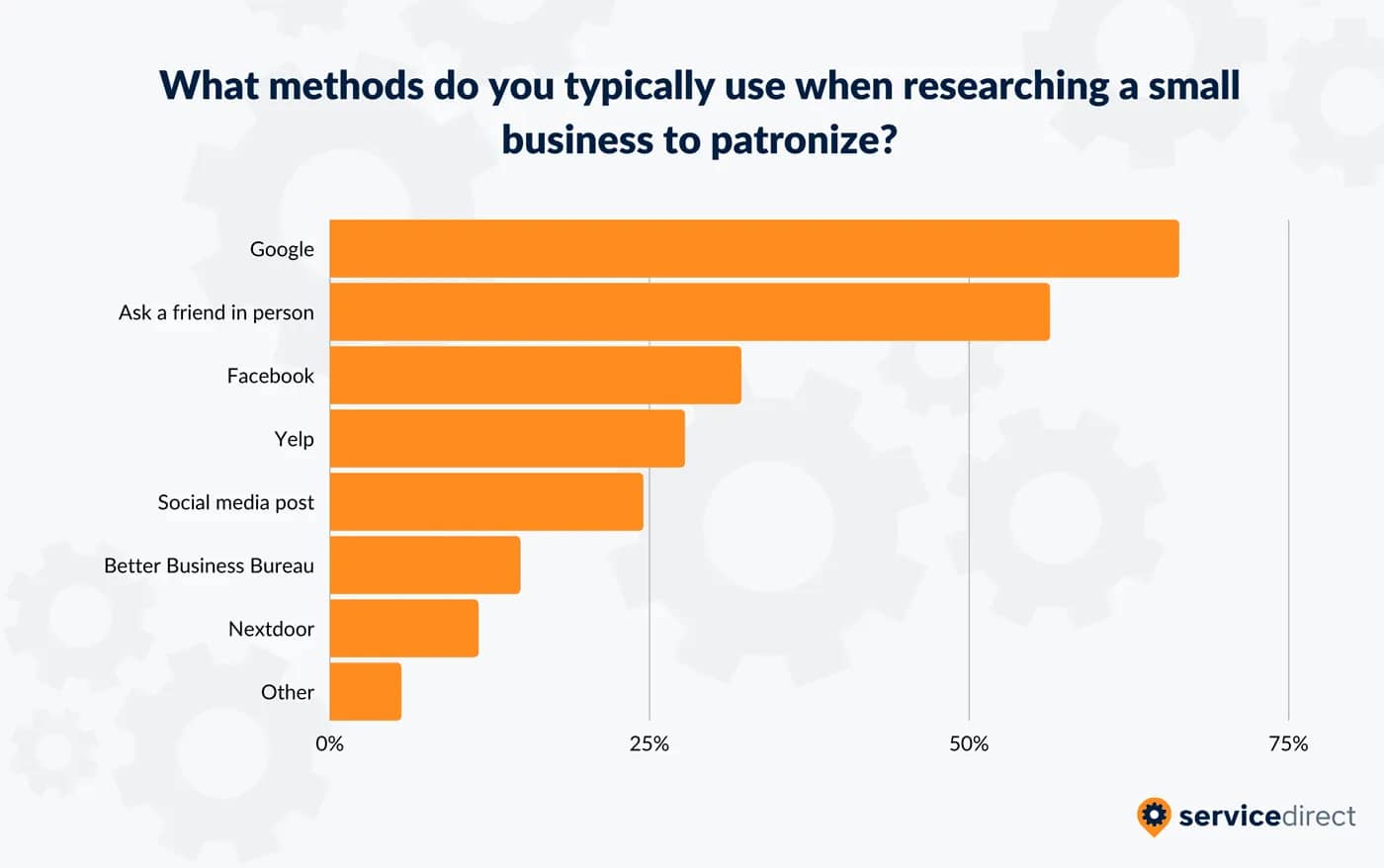
To start you’ll need to claim or create a free Google Business Profile. This is where potential customers can see key info on your business—location, business hours, Google reviews, photos, and more.
Then, you’ll want to keep it updated and optimized in order to ensure your information is always correct, which will help your business show up for relevant searches. Once you have your GBP showing up in the search results you’ll see an influx of new business.
Social Media
With 37% of consumers ages 18-29 patronizing a business because they saw a Facebook ad—and 33% as a result of seeing a TikTok ad—small businesses can use social media advertising to connect with a younger demographic.
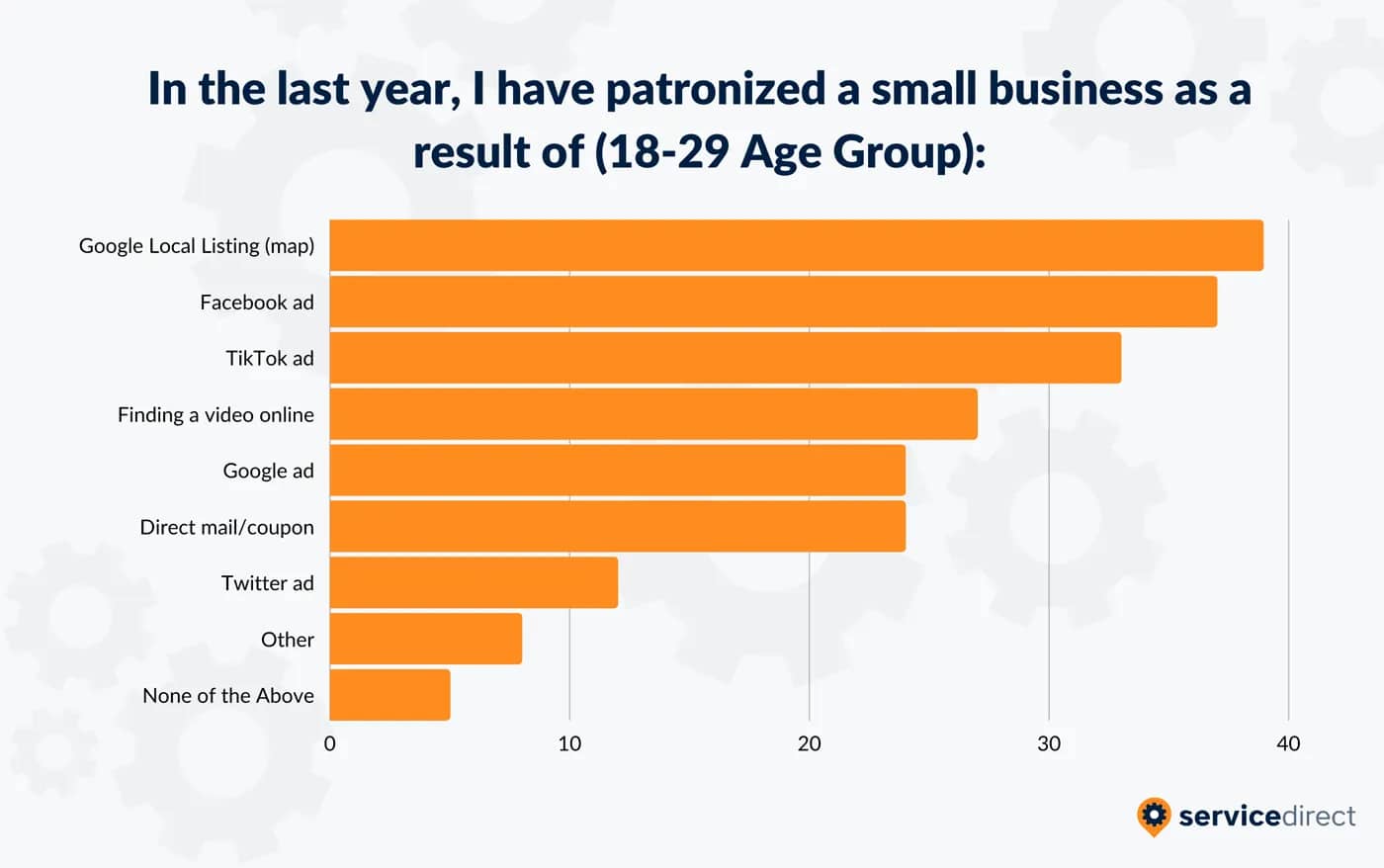
Social media can be especially effective for businesses that are looking to work with Millennials and the beginning of Gen Z. These people are buying cars and houses for the first time, starting families, and taking on financial independence.
So if your company is turning toward connecting with a younger generation, you might skip the BBB accreditation and look at amplifying your social media presence instead.
Work With Your Community
We’ve already mentioned that a majority of consumers prefer to patronize businesses that are associated with local organizations. Affiliations with these businesses act as strong markers of trustworthiness, which as you know is a major factor in turning a potential customer into a lead.
While the BBB is one of these types of organizations, it’s not the only option to get involved locally!
Other ways to work with local organizations and prove trustworthiness:
- Chamber of Commerce: Your local chamber of commerce consists of businesses in your area that are all working together. It’s a great way to network as well as stay involved in your community. While it isn’t free, membership is typically less expensive than BBB fees.
- Volunteer: In the eyes of the community, few things resonate more than donating your time to helping those in need. Whether you plan a company-wide clean-up initiative, offer your services for a reduced price to those who need them, or run a food bank collection competition, volunteering will go a long way to show potential customers that you care.
- Donate to Charitable Causes: There’s a reason people say “put your money where your mouth is.” 50% of consumers are more likely to patronize a business that supports charitable causes, which is why this is a great opportunity to show your community that you care.
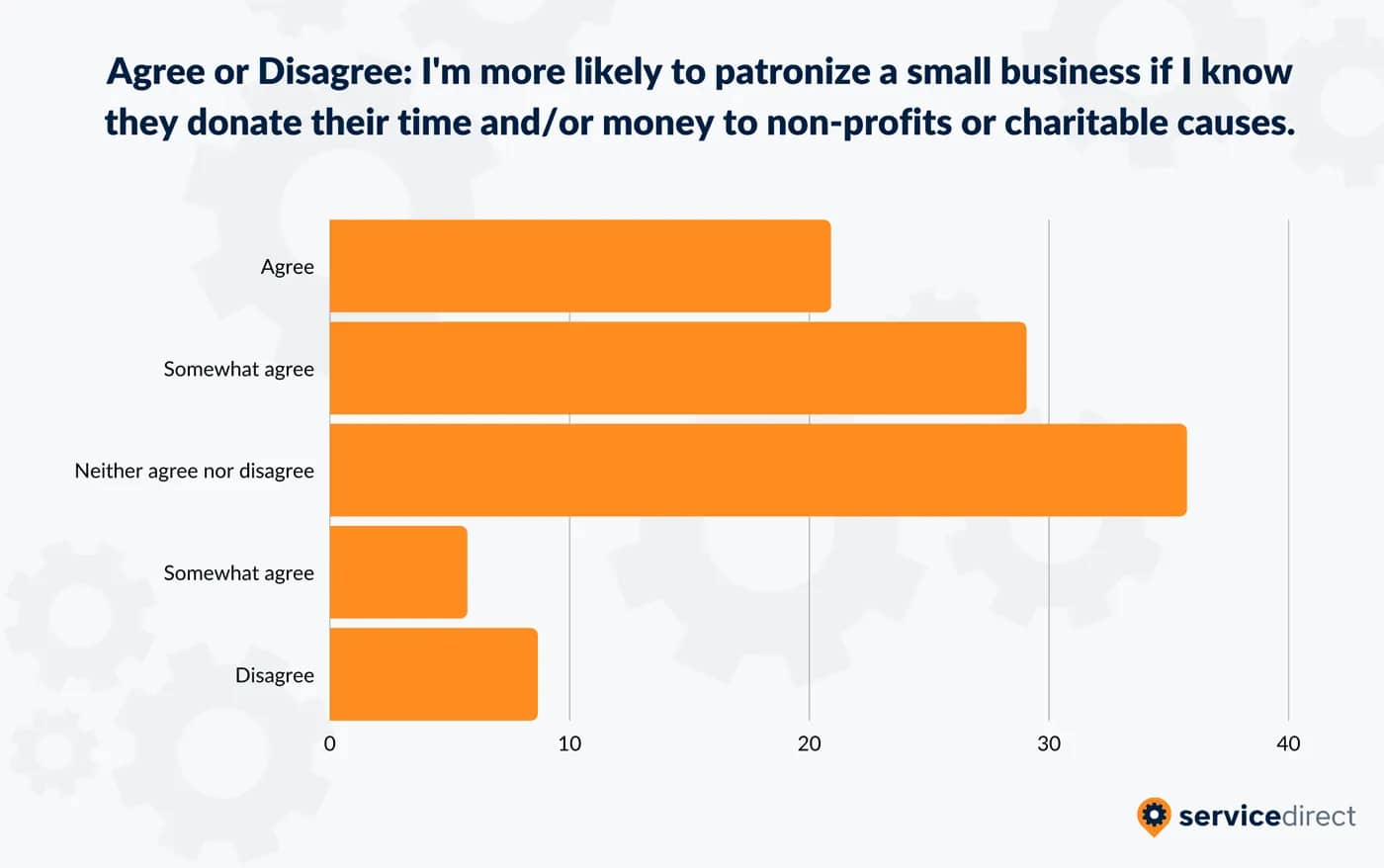
By working with your community in one way or another, you are working toward building key connections with potential customers.
in conclusion
Hopefully you now not only have a strong understanding of what it means to be accredited by the Better Business Bureau, but you also know the pros and cons of accreditation as well as some alternatives should you choose not to go that route.
The final takeaway that we want you to get from this blog is that nothing is ever set in stone when it comes to finding out what works best for you and your small business.
If you go through the process of becoming BBB accredited and decide after a year or more that it isn’t working for your company anymore, you can always leave. The same is true for the alternative. You can always work toward accreditation in the future if you decide not to go that route now.
No matter what you do, working toward increased exposure, trustworthiness, and connections with your community will help you grow to be the business that you envision.
“People need to know who they can trust, and BBB Accreditation helps a company stand out. If a business is accepted for accreditation, they become part of one of the most widely recognized benchmarks for trustworthy businesses.”

